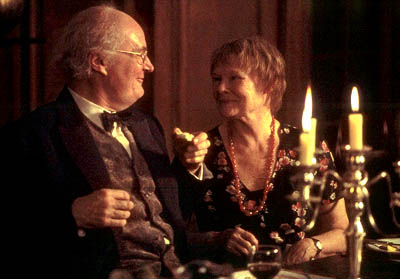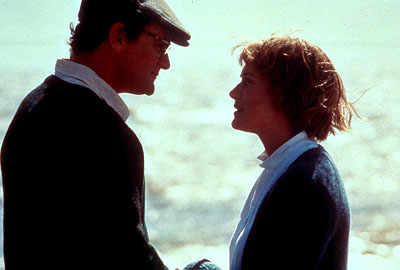

In somewhat of a career move for esteemed British actress Judi Dench, she plays acclaimed author Iris Murdoch. Dench (The Shipping News, Chocolat) usually plays headstrong, intelligent women. In Iris, based on the books Iris: A Memoir and Elegy for Iris both by John Bayley, Dench's character is suffering from the debilitating symptoms of Alzheimer's disease. Iris is a touching story of love between Iris and her husband Bayley. The movie takes place in two time periods; earlier in the century where John and Iris begin their relationship, and later where Iris has Alzheimer's. The direction by Richard Eyre (Rockaby, King Lear) does seem a little haphazard at times, but the emotion core of the story, which is the relationship between Iris and John, soon takes over.
By showcasing these two specific periods in the life of the couple, Eyre, who adapted the books with Charles Wood (Sharpe's Waterloo, Sharpe's Siege) is able to highlight two very different relationships. When they first meet, Iris (Kate Winslet, Quills, Holy Smoke) is the clearly in charge of their relationship. Later in life, John (Jim Broadbent, Moulin Rouge, Bridget Jones's Diary) is the one caring for Iris. When they first meet, John (Hugh Bonneville, Armadillo, The Emperor's New Clothes) is extremely shy and has a tremendous stutter. Iris' vitality and love of life fascinates him. Her affection for him is not clear at first. They are two extremely different people, slowly drawn to each other. As they grow closer, their love for each other grows deeper. John is able to care for Iris although she seems to think so differently than he does.
This portrayal of their relationship in its nascent stages only makes their latter relationship all the more poignant. Iris, once an articulate, clever woman, finds herself dependent on John for everything. Now, he is the one in charge of their relationship. She acts like a small child, and he has the heartbreaking task of caring for her every move. Of course, he does so without a moment's hesitation. The main criticism of this film is that is does not really go into anything else. For the most part, it overlooks the long relationship between Iris and John, and only superficially mentions why the two are famous. On the otherhand, this allows Eyre to focus completely on the John and Iris, which shifts onus of carrying the film onto the four actors.
The acting in Iris is the main reason to see it. The best scenes are with Dench and Broadbent. They are unbelievably tender and heartbreaking, especially as Iris' condition worsens. Broadbent goes from an affable old man to one wracked with worry. All semblance of his own life begins to disappear as he spends more time tending to Iris' needs. Dench in particular does a great job. Her Iris is like a child; hesitant, scared, and completely reliant on her husband. There is a visible transformation from the beginning of the film, when she still had her abilities about her. Winslet and Bonneville are also easily watchable, but they falter behind their counterparts. Winslet in particular shows the grace and life that Iris had when fully functional. It's a remarkable display of acting on all their parts, which netted Dench, Broadbent, and Winslet well-deserved Academy Award nominations.